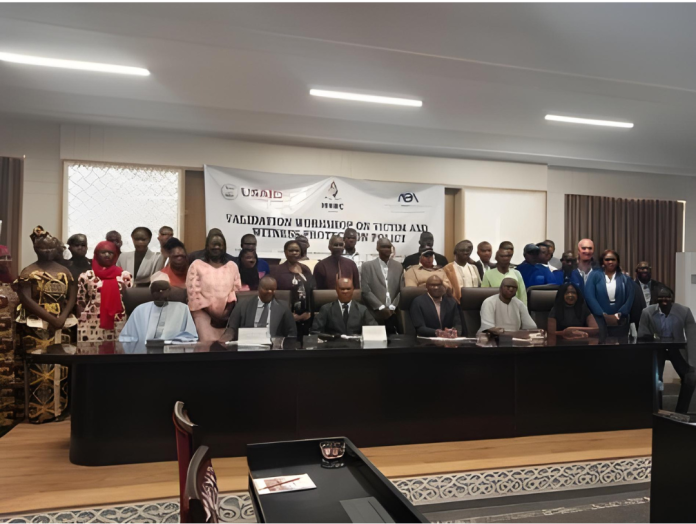By Sariba Manneh
The National Human Rights Commission (NHRC) has validated the victims and witness protection policy at a local hotel recently.
The policy aims to provide a comprehensive framework that guarantees the rights, safety and support to victims and witnesses involved in legal proceedings, by ensuring their cooperation and safeguarding their well-being throughout the judicial process.
The NHRC said this is a crucial step that underscores their commitment to safeguarding the rights and well-being of those involved in legal proceedings.
With the support of American Bar Association (ABA), the NHRC collaborated with a consultant to formulate a victim and witness protection policy. Stakeholders, including representatives from the Ministries of Justice and Interior; Gambia Police Force and Armed Forces; Tango, and ICTJ, actively supported this collaborative effort.
Speaking at the event, NHRC’s Chairperson, Emmanuel Daniel Joof, said the Victims and Witnesses Protection Policy is a set of guidelines, procedures and legal provisions designed to safeguard the safety, well-being and rights of individuals who have been victimized by crime or are witnesses to criminal activities.
“The primary objective of such policies”, he added, ‘‘is to ensure that victims and witnesses are adequately protected from harm, intimidation and retaliation, or any form of undue influence that may compromise their ability to participate effectively in the criminal justice process.’’
‘‘The Victims and Witnesses Protection Policy aims to create a supportive and secure environment that will encourage victims and witnesses to come forward and report crimes, and cooperate with law enforcement authorities in enhancing the effectiveness of the criminal justice system by holding offenders accountable, and ensuring justice for victims,’’ he said.
ELysee Sindayigaya, the Chief of Mission of the America Bar Association (ABA), emphasised that the initiative, rooted in the recommendations of the Truth, Reconciliation, and Reparations Commission (TRRC), “signifies a pivotal step” in the Government’s commitment to implement justice reforms, as spearheaded by the Ministry of Justice.
“The TRRC’s truth-seeking process is an ongoing journey, and it is imperative to recognize that the pursuit of truth is inseparable from safeguarding victims and witnesses, and their ability to testify without fear or coercion is fundamental in uncovering the truth and achieving justice,” he said.
Kebba Nfally Darbo, a representative from the Ministry of Interior, highlighted that his Ministry is tasked with internal security, while underscoring the significance of the inaugural National Victim and Witness Protection Policy’s validation workshop. He reaffirmed that establishing a protection mechanism is crucial for securing the cooperation of victims and witnesses in investigating and prosecuting criminals, as well as in creating a secure environment which is essential to achieving witness and victim cooperation, and ensuring they freely participate in the process. He concluded that without adequate protection, their willingness to contribute may be compromised.



















